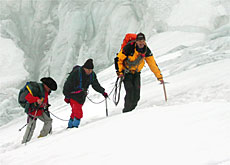
Threatened mountains reveal their charm

The vulnerability of mountain environments has been brought home to the Swiss through a series of climbs organised by the Swiss Mountain Guides Association.
Guides led a group of prominent and not so prominent people to the summits of various peaks as the association’s contribution to International Year of Mountains.
The goal of the mountain guides was to put their profession in the spotlight, but more importantly to raise awareness of the importance of mountain regions.
To spread the word about the fragility of mountain environments the association presented 100 of the most significant Swiss mountains as a gift to the world.
“It’s important that people who do not live in the mountains know how vital they are for everyone’s future,” said former Swiss government minister Adolf Ogi during an ascent of the 3,660 metre high Blüemlisalp.
The snowy peak rises above Ogi’s home village of Kandersteg in the Bernese Oberland.
UN envoy
In his current role as the United Nations special envoy for sport, development and peace, Ogi officially declared 2002 International Year of Mountains at the UN headquarters in New York last December.
“Mountains produce water and mountains produce energy,” Ogi said during the climb.
“People everywhere have to realise that the mountain environment has to be protected and we should pay heed to what people living in the mountains have to say.”
Radical changes
Ogi has seen radical changes along the route to the Blüemlisalp summit in his lifetime. The route to the top passes the tongue of the Blüemlisalp Glacier, which Ogi remembers being 100 metres longer when he was a child.
“It touches me when I see it and it makes me wonder why it has receded,” he said.
The demise of alpine glaciers is one reason why there is a sense of urgency during the International Year of Mountains, and why the mountain guides’ association is trying to highlight the problems with this event.
“The natural world can’t be bought in a store,” said Ogi. “It’s our responsibility to leave it as we found it.”
The climbing event organised by the Swiss guides was just one of numerous events around the world to mark the special year.
Promoting conservation
The ultimate goal of the UN is to “ensure present and future well-being of mountain communities by promoting conservation and sustainable development in mountain areas”.
The guides’ event was one of the most spectacular. Over a four-day period (August 29 to September 1), well-known – and unknown – people were taken into the mountains.
The Swiss astronaut, Claude Nicollier, successfully ascended the 4,000-metre-high Mönch. Switzerland’s Nobel Prize winning scientist, Rolf Zinkernagel, hiked through a mountain gorge in Zermatt.
Housewife
In central Switzerland, a housewife was led to the top of the Titlis and a group of blind people was taken up the 3,267 metre high Clariden.
But not all participants were able to reach the top. Only 400 metres below the summit of the Blüemlisalp, Ogi’s group had to turn back.
A steady rain and fog impaired visibility and there were no indications the situation would improve. The group retraced its route back down around gaping glacier crevasses.
Ogi has been on the top of the Blüemlisalp before, first with his father when he was 11 years old. And his great-great grandfather made the first ascent ever of the mountain in the late 19th century when he led British climbers to the peak.
“You have to accept when the conditions are not good enough,” Ogi said. “You must also have the courage, and I underline the word courage, to turn back. We tried, but we have to accept the rules of the mountains.”
swissinfo, Dale Bechtel, Blüemlisalp Hut
2002 is International Year of Mountains as declared by United Nations.
The highest Swiss peak is the Dufourspitze at 4,634 metres above sea level.
Millions of European households depend on fresh water from rivers flowing out of Swiss Alps.
Hydroelectricity from alpine lakes and rivers provides nearly 60 per cent of Switzerland’s electricity.
Alpine glaciers are receding at a rate faster than at any time over the past 5,000 years.
The goal of the Swiss Mountain Guides Association was to create an event that would “draw attention to the International Year of Mountains”.
The association wanted to expose people from all walks of life to the mountain environment, economies and cultures.
It also wanted to highlight the guiding profession.

In compliance with the JTI standards
More: SWI swissinfo.ch certified by the Journalism Trust Initiative





























You can find an overview of ongoing debates with our journalists here . Please join us!
If you want to start a conversation about a topic raised in this article or want to report factual errors, email us at english@swissinfo.ch.